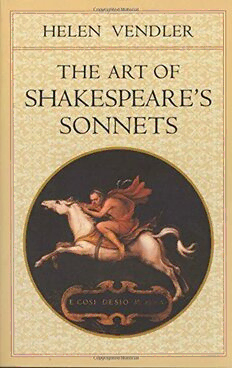
The art of Shakespeare's sonnets PDF
Preview The art of Shakespeare's sonnets
The Art of SHAKESPEARE’S SONNETS The Art of SHAKESPEARE’S SONNETS HELEN VENDLER The Belknap Press of HARVARD UNIVERSITY PRESS cambridge, massachusetts london, england Copyright©1997bythePresidentandFellowsofHarvardCollege Allrightsreserved PrintedintheUnitedStatesofAmerica DesignedbyMariannePerlak FirstHarvardUniversityPresspaperbackedition,1999 Publicationofthisbookhasbeenaidedbyagrantfrom theHyderEdwardRollinsFund. LibraryofCongressCataloging-in-PublicationData Vendler,HelenHennessy. TheartofShakespeare’ssonnets / HelenVendler. p. cm. Includesbibliographicalreferencesandindex. ISBN0–674–63711–9(cloth) ISBN0-674-63712-7(pbk.) 1.Shakespeare,William,1564–1616. Sonnets. 2.Sonnets, English—Historyandcriticism. I.Title. PR2848.V46 1997 821′.3—dc21 97–15306 For Joan Weitzner Levine Those friends thou hast, and their adoption tried, Grapple them unto thy soul with hoops of steel. —Hamlet ACKNOWLEDGMENTS Iamsincerelygratefultothosewhohaveprecededmeinwritingabout the Sonnets. Though I mention only recent scholars in my Introduc- tion, I am of course also indebted to all those, from the eighteenth cen- tury onward, who have reflected on these poems. My understanding of individual sonnets has been helped over the years by the editions and commentaries and books and articles and translations I have absorbed. The sheer volume of comment on Shakespeare precludes my footnoting workbyothersonindividualsonnets,butIregardmyownwritingaspart of a long collaborative effort to take the measure of Shakespeare—an ef- fort that shows no sign of waning. Over the nine years of work on this commentary, I was funded for residenceatvariousplaces,toallofwhichIamgrateful.TotheRockefel- ler Foundation for a residency in 1987 at the Villa Serbelloni in Bellagio, whereIbeganmyworkonthiscommentary;toreadandannotatetheSon- netsinthatmostgenerousofatmosphereswasadistincthappiness.Tothe National Humanities Center in North Carolina, where for two months the staff assisted me in getting an unwieldy manuscript under computer control,andwheretheFellowsprovidedabsorbingconversationonmany subjects; I thank Robert Connor, Director of the Center, for inviting his Trustees (of whom I was then one) to come for short stays at the Center. ToDrueHeinzandtheHawthorndenFoundationforamemorablefive- week stay at Hawthornden Castle, Edinburgh, Scotland; the poet Daniel Halpern encouraged me to apply, and I owe him gratitude for the com- pany(andsolitude)Ifoundthere.TotheWilsonCenter,where(thoughI wasfundedforworkonYeats)Ialsobeganrevisionsofthefirstcomplete draft of this work; my semester stay was enlivened by the company of James Morris, Director of the Literature and Culture Division. To Mag- dalene College, Cambridge University, where, as the Parnell Fellow, I spentthreemonthsineloquentlybeautifulsurroundingsworkingonvari- ousprojects,ofwhichthiswasone;IthanktheMaster,SirJohnGurdon, and the Fellows for their hospitality and friendship. And finally, to Har- vardUniversity,whichgrantedmesabbaticalleavein1994–95,aleavethe more deeply appreciated because it came in the wake of illness. { vii } Acknowledgments Though I do not normally show work in progress to others, the long evolution of this commentary led to my giving parts of it as lectures, and to printing four essays deriving from it (see Bibliography). I thank espe- ciallyProfessorRuthStevensonandtheDepartmentofEnglishatUnion College for my time spent there as Lamont Professor; the lecture and workshop on the Sonnets that I gave there has appeared in a collection of essaysonteachingShakespeareofwhichProfessorStevensoniscoeditor. WhenProfessorSylvanBarnetofTuftsUniversityrequestedashortessay toincludeinhisrevisedSonnetsfortheSignetShakespeare,hecausedme to think further about synecdoche; he also has been unstintingly helpful on many other occasions. Professor Russ MacDonald of the University ofRochestersolicitedanessayfrommeforhiscollectionShakespeareRe- read. And the American Academy of Arts and Sciences, by inviting me to speak, generated an essay printed in its Bulletin. Professor Jonathan Bennett of the Department of Philosophy at Syracuse University evoked another effort, a lecture, given at Syracuse, which later became one of threeMessengerLecturesonShakespeare’sSonnetsatCornellUniversity, where my kindly host was the poet A. R. Ammons. The genesis of the commentary came from a 1973 essay on sonnet 129 that I wrote in honor ofI.A.Richards,attheinvitationofthelateProfessorReubenBrowerof Harvard University; the delights of thinking about sonnet 129 were such that I found I could not forgo thinking about the other sonnets. I also wish to thank Professor Massimo Bacigalupo of the University of Genoa forsendingmeaphotocopyofBasilBunting’scopyofShakespeare’sSon- nets(alteredunderEzraPound’sdirection),andforalertingmetotheex- istence of Bunting’s Shakespeare. Two poets—my former colleague at Boston University, George Starbuck, and Howard Moss of The New Yorker—by their inspired parodies of the Sonnets, helped me see (or see through) the poems with a poet’s eye; I am sorry that they did not live to receive my thanks. Professor Emeritus George T. Wright of the Uni- versity of Minnesota was kind enough to take pleasure in my writing on Shakespeare as he saw it evolve over several years, and gave me much- needed support when my ideas were still sketchy ones. Elsie Duncan- Jones, scholar of Hopkins and Marvell, by her friendship, her love of poetry, and her spirited interest in literary criticism, encouraged me by example. Iowedebtsofgratitudetocolleaguesclosetohome:toPresidentNeil Rudenstine,whopermittedanextrasabbaticaltermandareducedteach- ingloadinonesemesterinordertoletthisworkgoforward,andwhovis- itedmyundergraduateseminartodiscusstheSonnetswithus;toProfessor { viii } Acknowledgments Gwynne Evans, editor of the Cambridge Shakespeare, who, in an act of extraordinary generosity, read my manuscript and offered numerous an- notations, additions, and corrections from his exemplary knowledge of the texts; errors remaining are mine. The late Professor Hyder Rollins, editoroftheVariorumSonnets,leftabequesttotheHarvardEnglishDe- partment which helped me to meet research expenses. I warmly thank MargarettaFultonoftheHarvardPress,myimpeccableeditorsince1960, for her long sponsorship of this project; Maria Ascher, my erudite copy- editor, who contributed the anagram-insight noted of sonnet 8; and my former assistant Susan Welby, who resiliently coped with computer con- version and successive manuscripts. IamgratefultotheGettyFoundationforpermissiontoreproduceon my book jacket a Renaissance panel painting incorporating a quotation fromPetrarch’sCanzoniere;thepaintingisthoughttobebyHolbein,and was once owned by Prince Henry (the son of James I). The Harvard Li- brary,theLibraryofCongress,andtheFolgerShakespeareLibrarywere places indispensable to me, as they have been to so many others. The Quarto Sonnets are reproduced by permission of the Folger Library. MymotherwasthefirstpersontointroducemetoShakespeare’sson- nets.Shequotedthemoften,andhadmemorizedmanyofthem.Herlast pieces of writing (which we found after Alzheimer’s disease had robbed her of memory) were fragments of the Sonnets which, either from fear of forgetting or as a means of self-reassurance, she had written down on scrapsofpaper.ItisnomeantributetotheSonnetsthatthey,ofthehun- dredsofpoemssheknewbyheart,werethelasttofade.Iremaingrateful to her and to my father (my first teachers), and to the university instruc- torswhoenlargedmyknowledgeofpoetry:amongthedead,SisterMarie Barry,I.A.Richards,DouglasBush,ReubenBrower,NorthropFrye,and Rosemond Tuve; among the living, Morton Berman and John Kelleher. Theirmindsformedmine,andIheartheirvoiceswhenIreadthepoems they taught me. Inaffectionandadmiration,IhavededicatedthisbooktoJoanLevine. Wemetin1960asyoungmothersatCornell,andwewerecolleaguesfor manyyearsintheDepartmentofEnglishatBostonUniversity.Evenings of talk and laughter we have spent together are now so many as to be in- numerable; because many of our conversations were about the Sonnets, I feel her presence throughout this commentary. Finally,ImustthankShakespearehimself,whosepoemshavekeptme companyforsomanydecades.HisenvoitotheyoungmanoftheSonnets seems strangely applicable to himself: { ix }
